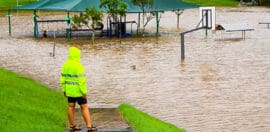Australia’s social progress ranking hurt by poor environmental performance

23 September 2019 at 3:53 pm
Australia is lagging well behind other countries when it comes to reducing greenhouse gas emissions, according to new research measuring the nation’s social progress.
The 2019 Social Progress Index ranked 149 countries by measuring outcomes in areas from shelter and nutrition, to rights and education.
While Australia ranked 12th overall, the nation rated poorly in environmental protection – ranking 91st in the greenhouse gas emissions by GDP indicator – and in other areas including shelter and healthcare access.
Recent figures show Australia’s greenhouse gas emissions have risen to their highest level in seven years.
Experts say the results should prompt Australian policymakers to place a greater focus on achieving social progress rather than just on economic performance.
Professor Kristy Muir, the CEO of the Centre for Social Impact, said the index results showed that Australia was making progress in some areas but also had room for improvement in others.
“The Social Progress Index for 2019 shows Australia holding steady within the top tier of global rankings and performing well on some important indicators,” Muir said.
“However Australia has significant room for improvement on environmental issues like greenhouse gas emissions and social issues like equal political power or equal access to quality healthcare.”
Australia performed strongest in the category “access to advanced education” – ranking second – in recognition of the nation’s high rate of people in tertiary schooling.
But conversely, the nation ranked 41st in “access to basic knowledge”, and 118th in the sub-category of “gender parity in secondary enrollment”.
Muir said these rankings revealed the impact of public policy interventions and social developments.
“There is a lot of focus on GDP but it is a reductive and misleading yardstick for a country’s progress. While it can be useful to measure economic production and growth, it won’t reveal whether life is actually improving for the people,” Muir said.
“The Social Progress Index tells a more complete story of how life is changing in a country by measuring a range of crucial indicators. And by revealing how countries are performing relative to one another, the index can also act as a prescriptive tool for policymakers.”
CSI research fellow Dr Megan Weier agreed, telling Pro Bono News that Australia’s underperformance in parts of the index showed that governments needed to focus on more than simply generating economic wealth.
“I think traditionally, progress has been thought of in economic terms. But what we see is that there is a positive correlation between a country’s GDP and its social progress index score,” Weier said.
“So if you’re going to be improving the social progress of a society, we think that would also have positive impacts on the economy because people live healthier and happier [lives].”
CSI is in the process of developing a subnational Social Progress Index, comparing Australian states and territories using the same framework.
Weier said this data could be used to push policymakers and governments in different states and territories to focus on the particular issues for their region.
She said she hoped the index would be useful for the social sector as well.
“Organisations can use the index results to argue for why there needs to be more spending in a particular area,” she said.
“Or even just as a way of communicating their message and getting a really common language that can be used to translate a message to multiple audiences.”
Full results from the 2019 Social Progress Index can be seen here.








Can you tell us how the data was gathered and by whom. Seems to me, having looked at it that Australia did very well and those areas which have brought criticism from some are hardly the responsibility of government.
The report failed to mention that per capita Australia has spent more on so-called renewable energy than any other country in the world!
Can you also tell us who funds this research?